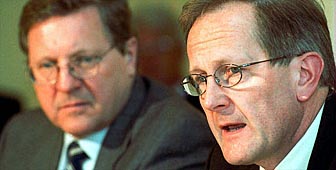Greater protections demanded for civilians threatened by conflict

Ministers from 13 countries, meeting in the Swiss city of Lucerne, have called for better protection of civilians threatened by conflict. The group demanded stricter controls on small arms, and said paramilitary groups should be outlawed.
The Swiss foreign minister, Joseph Deiss, along with his Canadian and Austrian counterparts, concluded the meeting with a statement saying they were ready to support UN calls to protect civilians caught up in conflict.
The problem is both vast and urgent. Since the beginning of the 20th-century, civilian casualties in conflicts have grown steadily. “The civilian population is the first and most important victim of conflicts,” said Ambassador Raimund Kunz from the Swiss foreign ministry. “There are around 70 to 80 million refugees and internally displaced people around the world.”
A key issue discussed at the Lucerne conference was the proliferation of small arms, which were blamed for undermining both the security of civilians, as well as their potential for development. The delegates agreed that these weapons weaken law and order, while fostering terrorism and criminality.
They called for stricter international controls, and stronger cross-border cooperation to control the manufacture and circulation of these weapons.
The conference also called for the outlawing of paramilitary groups, saying they were a threat to countries’ security, as well as civilians, military personnel and international law.
The delegates agreed to work closely with NGOs to try and stamp out paramilitaries. They also called on the private sector to get involved – perhaps a veiled appeal to arms firms to stop supplying weapons to paramilitary forces.
The 13-country grouping was formed in 1998 to focus on the plight of victims. Launched by Norway and Canada, it includes Switzerland, the Netherlands, Austria, the Irish Republic, Greece, Slovenia, Jordan, Mali, Thailand, Chile and South Africa.
swissinfo with agencies

In compliance with the JTI standards
More: SWI swissinfo.ch certified by the Journalism Trust Initiative
You can find an overview of ongoing debates with our journalists here . Please join us!
If you want to start a conversation about a topic raised in this article or want to report factual errors, email us at english@swissinfo.ch.